One child at a time, WHO and the World Bank transform the lives of millions of children exposed to a silent disease – schistosomiasis
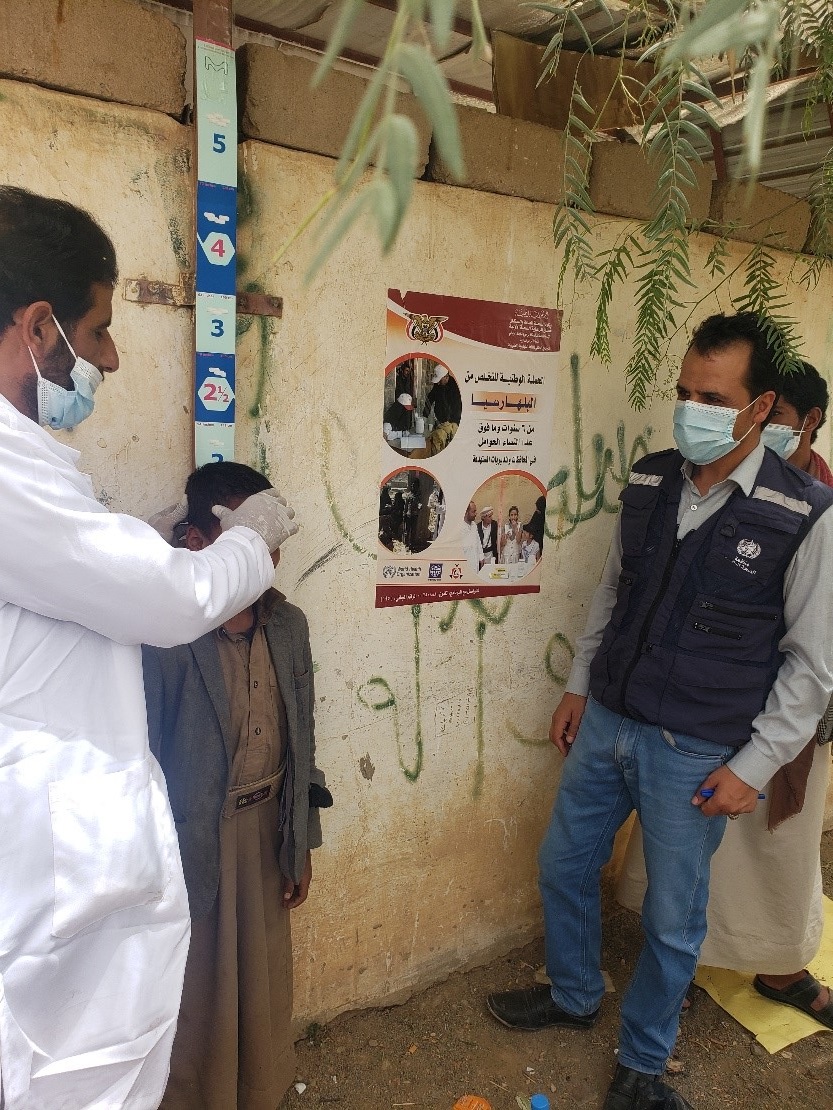
31 August 2022, Aden, Sana’a – Schistosomiasis is an acute and chronic parasitic disease caused by infection with blood flukes (trematode worms). This disease infects vulnerable communities in Yemen exposed to infested water – putting many lives at risk, especially those of young children.
Through the Emergency Health and Nutrition Project and its successor the Yemen Emergency Human Capital Project, the World Bank’s International Development Association and WHO are working to detect, diagnose, treat and care for infected patients with schistosomiasis across Yemen.
The importance of tackling this often-overlooked disease is critical. Schistosomiasis transmission occurs when people suffering from the disease contaminate freshwater sources with their excreta containing parasite eggs, which then hatch in water. Inadequate water, sanitation and hygiene and snail control increase schistosomiasis transmission. Children are especially vulnerable to infection, as lack of education and playing habits expose them to dangers. Freshwater snails can penetrate the skin when children come in contact with contaminated water.
The disease severely impacts a child’s performance in school, ending in stunted growth, reducing productivity, and affecting their learning abilities and physical and cognitive development. Schistosomiasis-associated anaemia is also prevalent, contributing to fatigue, weakness, and reduced focus. The disease is often fatal; if left untreated, schistosomiasis will eventually lead to debilitating long-term irreversible health complications in the urinary tract, liver fibrosis, kidney failure, bladder cancer, nephropathy, gastrointestinal bleeding, gastrointestinal obstruction, malnutrition, infertility, and pulmonary hypertension etc. Tackling schistosomiasis will give Yemeni children an equal opportunity in life, an equal opportunity for their right to education and lead the lives they deserve without disease holding them back in a vicious cycle of poverty.
To this day, schistosomiasis is one of Yemen’s most prominent health problems, as an estimated 6 million people are at risk of infection and 3 million are infected. The COVID-19 pandemic has disproportionately overshadowed the importance of eliminating neglected tropical diseases – especially schistosomiasis. Although schistosomiasis doesn’t receive as much attention as other conditions, its prevalence and potential risk are very high.
The World Bank and WHO are at the forefront of the health response to eliminate schistosomiasis. After years of making progress, scale-up interventions were implemented to break the vicious cycle of the socio-economic impact that the disease has on Yemeni communities.
Despite the severity of the condition, it is fully treatable. WHO and the World Bank delivered life-saving treatment across 9 governorates and 40 districts in Yemen. National schistosomiasis and deworming mass distribution campaign in May 2022 distributed anti-helminthiasis medication (albendazole) and anti-schistosomiasis (praziquantel) to a total of 1 859 469 people above the age of 6, reaching 80% of the target population.
The ongoing schistosomiasis campaign aims to eliminate the disease from communities in Yemen by transforming lives and alleviating children’s suffering from diseases that could otherwise be treatable and preventable. Protecting children from schistosomiasis and safeguarding their educational rights and socioeconomic well-being bring hope to communities in Yemen.
Yemeni women at the forefront of the COVID-19 response
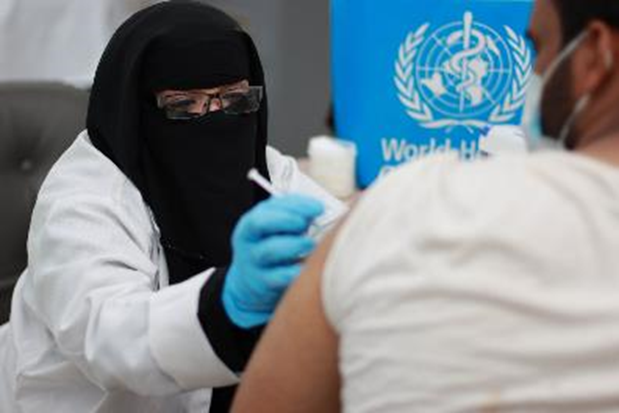 Aden, 31 August 2022 – For the past 13 years, Yemen has ranked last in the World Economic Forum’s Global Gender Gap Index. Where women lack access to participate in health, education, the economy and politics, societies and future generations suffer. That’s why achieving a basic level of participation of women in the workforce against COVID-19 was a key result indicator in the design of the Yemen COVID-19 Response Project implemented by WHO and the World Bank.
Aden, 31 August 2022 – For the past 13 years, Yemen has ranked last in the World Economic Forum’s Global Gender Gap Index. Where women lack access to participate in health, education, the economy and politics, societies and future generations suffer. That’s why achieving a basic level of participation of women in the workforce against COVID-19 was a key result indicator in the design of the Yemen COVID-19 Response Project implemented by WHO and the World Bank.
Dr Adham Rashad Ismail Abdel Moneim, the WHO Representative to Yemen explains, “The Yemen COVID-19 Response Project Results Framework included a target of females accounting for one in three COVID-19 vaccinators. One year later however, women make up more than half the COVID-19 vaccination workforce.”
Several key enablers of success contributed to this target being so dramatically exceeded.
First, the partnership between the Bank and WHO on the Yemen COVID-19 Response Project from April 2020 onwards, built on the foundations of the Emergency Health and Nutrition Project since 2017, in which gender-responsive and gender-sensitive programming was integral to the project management approach.
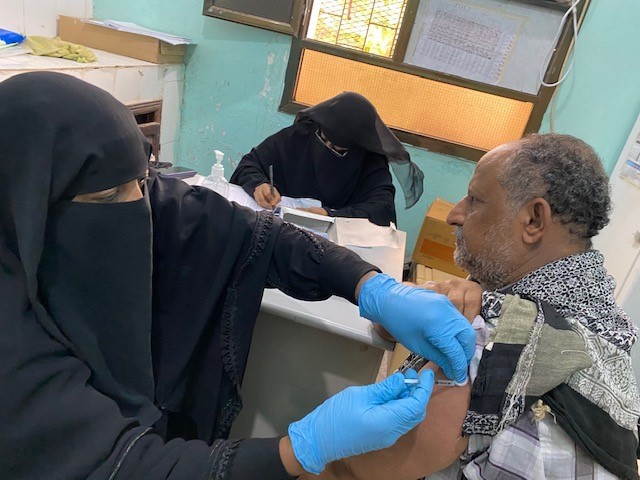 Meaningful consultations with female health workers and community members, and awareness sessions on gender, were built into the Emergency Health and Nutrition Project design, done routinely, and reported on every 6 months. This helped to sensitize the parties involved and built acceptance at the outset of the Yemen COVID-19 Response Project, of the need for gender-sensitive services to better meet the needs of Yemeni women and the wider community.
Meaningful consultations with female health workers and community members, and awareness sessions on gender, were built into the Emergency Health and Nutrition Project design, done routinely, and reported on every 6 months. This helped to sensitize the parties involved and built acceptance at the outset of the Yemen COVID-19 Response Project, of the need for gender-sensitive services to better meet the needs of Yemeni women and the wider community.
Advocacy with the health authorities in the design of Yemen COVID-19 Response Project and in the development of the project operational plan helped to draw attention to the importance of increasing the participation of women in the health workforce. This included a gender-sensitive model being used in the development of the COVID-19 vaccination plan. In this way, the project successfully implemented top-down approaches and involved managers to reduce gender discrimination and build a stronger workforce.
Throughout the project’s implementation, this advocacy continued, along with continued engagement and consultation with female health workers and beneficiaries, and awareness sessions for all health workers on environmental and social safeguards. The Yemen COVID-19 Response Project project team also made regular requests for, and investments in, sex-disaggregated data both on vaccinators and people receiving vaccination. The availability of female vaccinators was closely monitored by WHO, in line with the Results Framework, and coupled with political will at the outset to recruit more female vaccinators in order to ensure the target was achieved.
It was hoped, and advocated for, that having more female vaccinators, would lead to higher levels of vaccination uptake among women. However, the data so far indicate that for every 3 men, only one woman, has received a COVID-19 vaccine. Noting that while recruitment of female vaccinators is within the scope of the health sector, assuring vaccine demand requires all-of-society action. Additional factors include that international travel may have been a key motivator for vaccination, and most travellers out of Yemen are men. In some governorates, there are restrictions on women travelling alone and men take decisions as to when and why women should seek health care, which may also have limited female access to vaccination sites.
Training senior health staff to improve service delivery in Yemen
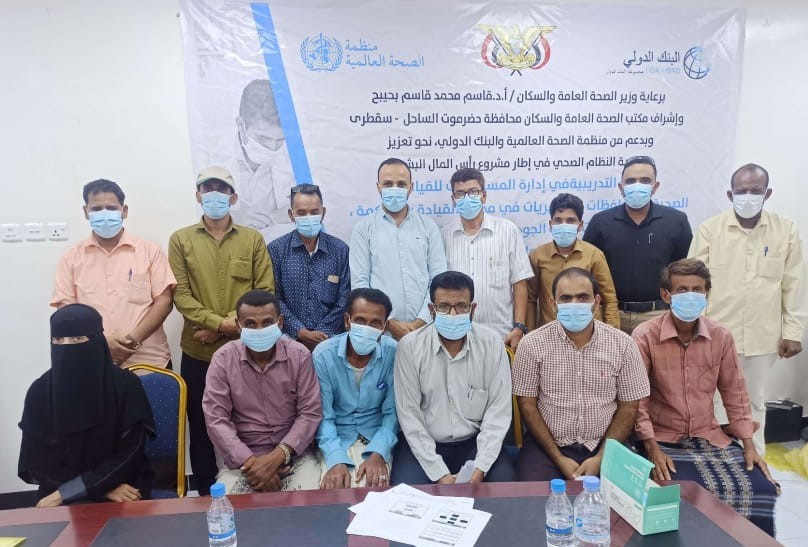
Aden, Sana’a, 31 August 2022 – Quality care in health facilities is key to a high performing health system. To achieve this, managers and senior officials must be equipped with the skills, knowledge and attitude to course correct when there are challenges and lead action for continuous improvements in service delivery.
In 2019, through the Emergency Health and Nutrition Project, with the support of the World Bank, WHO developed the hospital care and management programme for Yemen, to help in addressing major issues in hospital management. A pilot phase initially trained 150 hospital managers and then training was rolled out to 1410 senior health workers.
Now, since March 2022, under the successor project to the Emergency Health and Nutrition Project, the Yemen Emergency Human Capital Project, an additional 430 health workers have participated in the training in the governorates of Al-Mahra, Hadramaut, Marib, Shabwa and Socotra. The programme has now reached all World Bank-supported hospitals in Yemen.
Over 1700 senior health workers have now completed the training from across the 22 governorates of Yemen. The participants include 1380 hospital directors, managers and senior staff, 210 district health managers and 250 governorate health managers.
The training covers 5 essential modules to improve hospital performance: governance, leadership and strategic planning; quality and patient safety; health information management; hospital emergency and disaster management; and supply chain management. Each module runs for 4 days, via a face-to-face workshop. Participants join one or more of the modules, depending on its relevance to their current role in the health sector. All modules are delivered in Arabic, using interactive learning involving lectures, plenary and group discussions, case studies, mini-projects and field visits.
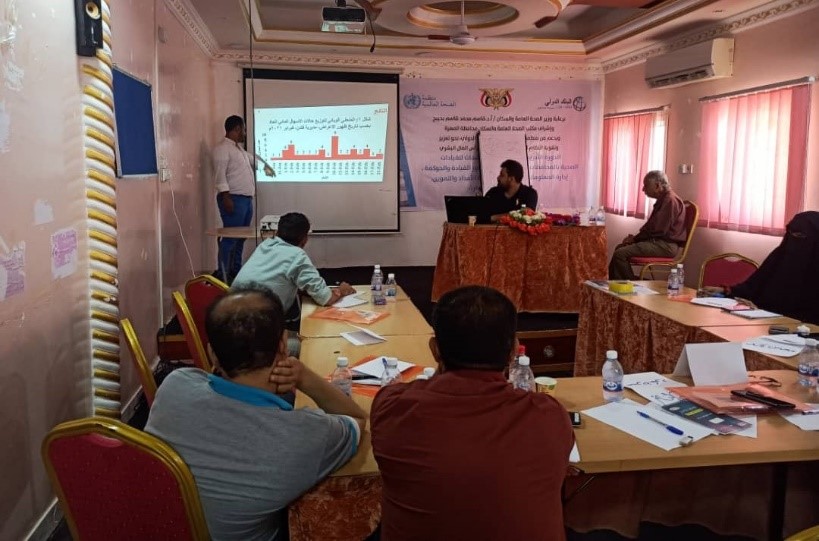 For quality assurance, WHO directly supervises the training activities in each governorate through several channels, including field presence, direct daily electronic evaluation of trainees, visits by the internal monitoring and evaluation team, and the presence of governorate-level supervisors nominated by the central health authorities. Participant evaluations are reviewed on a daily basis, and training activities are adjusted accordingly, to suit the needs of each group of learners.
For quality assurance, WHO directly supervises the training activities in each governorate through several channels, including field presence, direct daily electronic evaluation of trainees, visits by the internal monitoring and evaluation team, and the presence of governorate-level supervisors nominated by the central health authorities. Participant evaluations are reviewed on a daily basis, and training activities are adjusted accordingly, to suit the needs of each group of learners.
The training materials were prepared by WHO Regional Office for the Eastern Mediterranean, in collaboration with international specialists and academics in the field of hospital care and management, and International Hospital Federation trainers. This programme has also been implemented in Afghanistan, Islamic Republic of Iran and Iraq with WHO support.
In Yemen, there are 48 health care management trainers who lead delivery of the programme. These trainers come from the central authorities, public universities in Aden, Hadramaut and Sana’a, Yemen Council for Medical Specializations, and private institutions such as Balqees College and Al-Razi University.
The WHO country office in Yemen took the lead in translating all the course materials into Arabic and has made the Arabic version available to other interested countries. In November 2021, a review meeting was held with the trainers to check all the Arabic translations and to contextualize materials, practical scenarios, peer learning, and sharing of experiences relevant to the context of Yemen. This helped to enhance the preparedness of the trainers to become well prepared for the rollout of the programme.
Dr Saeelah Awadh, the General Manager for Zungibar Hospital in Abyan Governorate and a participant in health care management, articulated the impact of this training on their day-to-day tasks, saying: “this training is targeting us in the management unit, in terms of how to execute our tasks properly for improving the service provided to the public”.
The ongoing data collection and analysis from the health care management programme show around 97% participant satisfaction with the programme. Almost all participants (98%) recognized the importance of training topics to enhance and strengthen the quality of services provided in their facilities.
Data review also shows managers and senior officials are gaining the skills and knowledge they need to carry out their roles safely and effectively. Preliminary analysis shows a significant improvement between the pre-test (average 32%) and post-test (average 88%) scores. Dr Adham Rashad Ismail Abdel Moneim, WHO Representative to Yemen, reflected: “These initial results indicate that the health care management programme is helping to fill critical gaps in knowledge that will contribute to strengthening hospital performance towards achieving the universal health coverage in Yemen.”
The next steps for the health care management in Yemen will be to launch phase 2 of the programme with development of 2 more modules on human resources management and financial management. This work is starting in the second half of 2022, with the ongoing support of the World Bank via the Yemen Emergency Human Capital Project.
Giving newborns a healthy start to life in Yemen
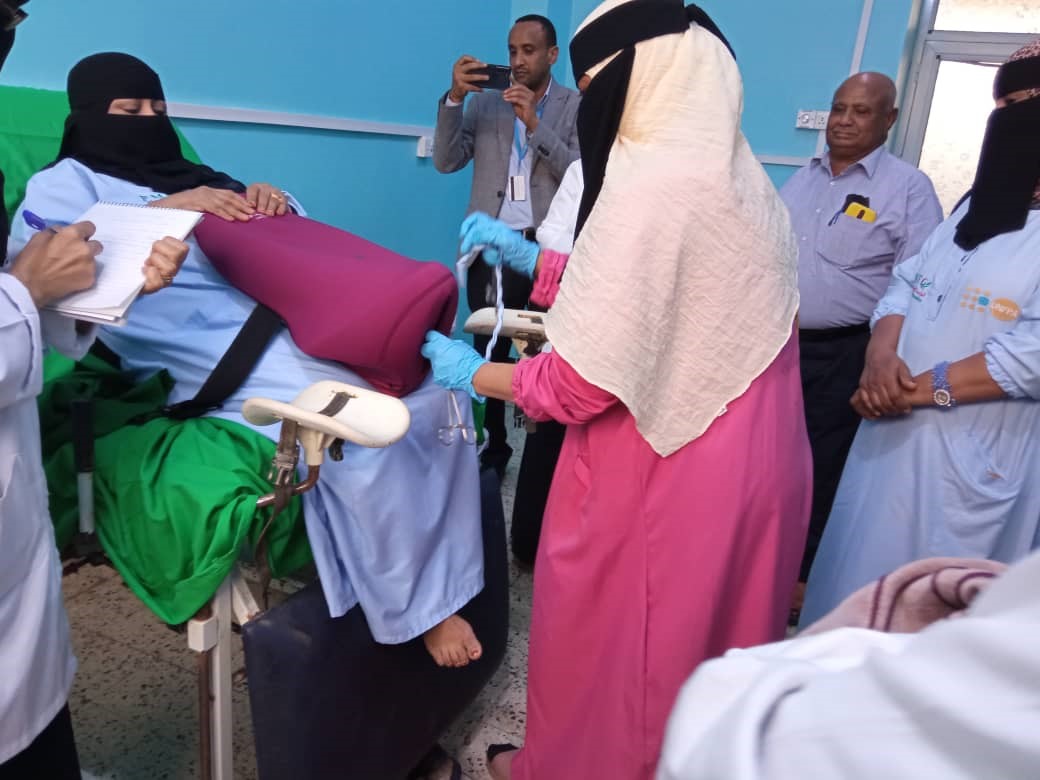 31 August 2022, Aden – The first 90 minutes of a newborn’s life are a critical window to prevent sepsis, asphyxia, and other birth complications. In these first moments, there are simple, cost-effective practices that can benefit every mother and child.
31 August 2022, Aden – The first 90 minutes of a newborn’s life are a critical window to prevent sepsis, asphyxia, and other birth complications. In these first moments, there are simple, cost-effective practices that can benefit every mother and child.
The key components are to dry the baby immediately and thoroughly after birth, to do immediate skin-to-skin contact for at least 90 minutes, to clamp the cord after pulsations stop and cut the cord with a sterile instrument, and to initiate early breastfeeding.
Other key interventions include ensuring the presence of a birth companion, adopting a position of choice, providing adequate food and fluids, using evidence-based criteria for episiotomy, avoiding unnecessary practices such as fundal pressure and forced pushing, and giving oxytocin within one minute of birth.
With the support of the World Bank, WHO and the authorities in Yemen, are providing coaching to health workers to change hospital practices and improve the quality of newborn care.
Coaching in early essential newborn care has started at Al Sadaqa, the biggest referral hospital in Aden, led by 13 facilitators, who passed their skills on to another 7 staff members, as well as 6 staff from other hospitals (Al-Sha’ab, Al-Razi and Ibn Khaldoun) and governorate newborn health coordinators.
The coaching uses on-the-job methods and immediate application in the workplace, with no lectures, presentations, or reading materials. Needed supplies were also provided to the participating hospitals, including MamaNatalies, NeonNatalies, glogerm, room thermometers, and wall clocks with digital number displays for hours, minutes and seconds.
The participants’ skills and knowledge significantly improved as measured in pre-and post-test results. Before the coaching, the participants’ scores averaged 44% in a written test, 0% for the management of a breathing baby, and 30% for the management of a non-breathing baby. After the coaching, these scores increased to 81%, 96%, and 93%, respectively.
“This is a huge step forward and a starting point for positive improvements in maternal and child health in Yemen,” said the WHO Representative to Yemen Dr Adham Rashad Ismail Abdel Moneim.
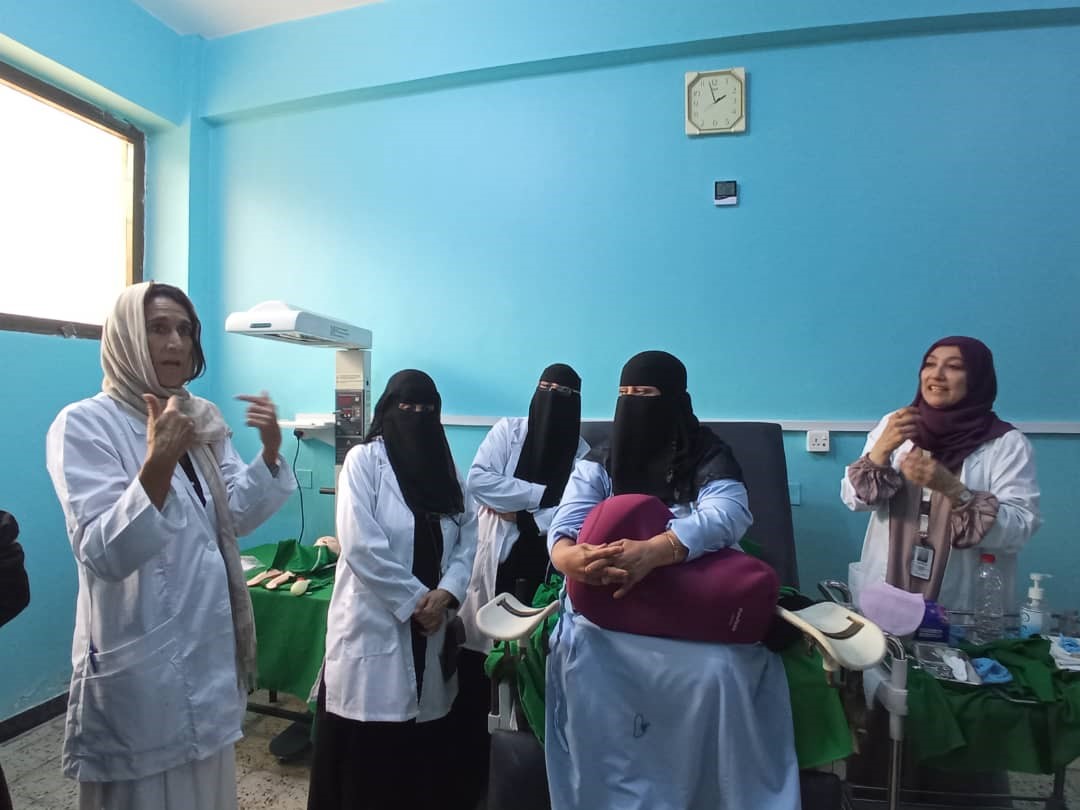 Moving forward, plans are under way to share early essential newborn care knowledge and skills with all key staff working in the labour department, including midwives, obstetricians, pediatricians and nurses from neonatal Intensive care units, between August and October 2022. WHO has also developed a detailed staff coaching plan for the participants, with supportive supervision and review of hospital registries to measure improvements in the quality of care provided to newborns and mothers.
Moving forward, plans are under way to share early essential newborn care knowledge and skills with all key staff working in the labour department, including midwives, obstetricians, pediatricians and nurses from neonatal Intensive care units, between August and October 2022. WHO has also developed a detailed staff coaching plan for the participants, with supportive supervision and review of hospital registries to measure improvements in the quality of care provided to newborns and mothers.








